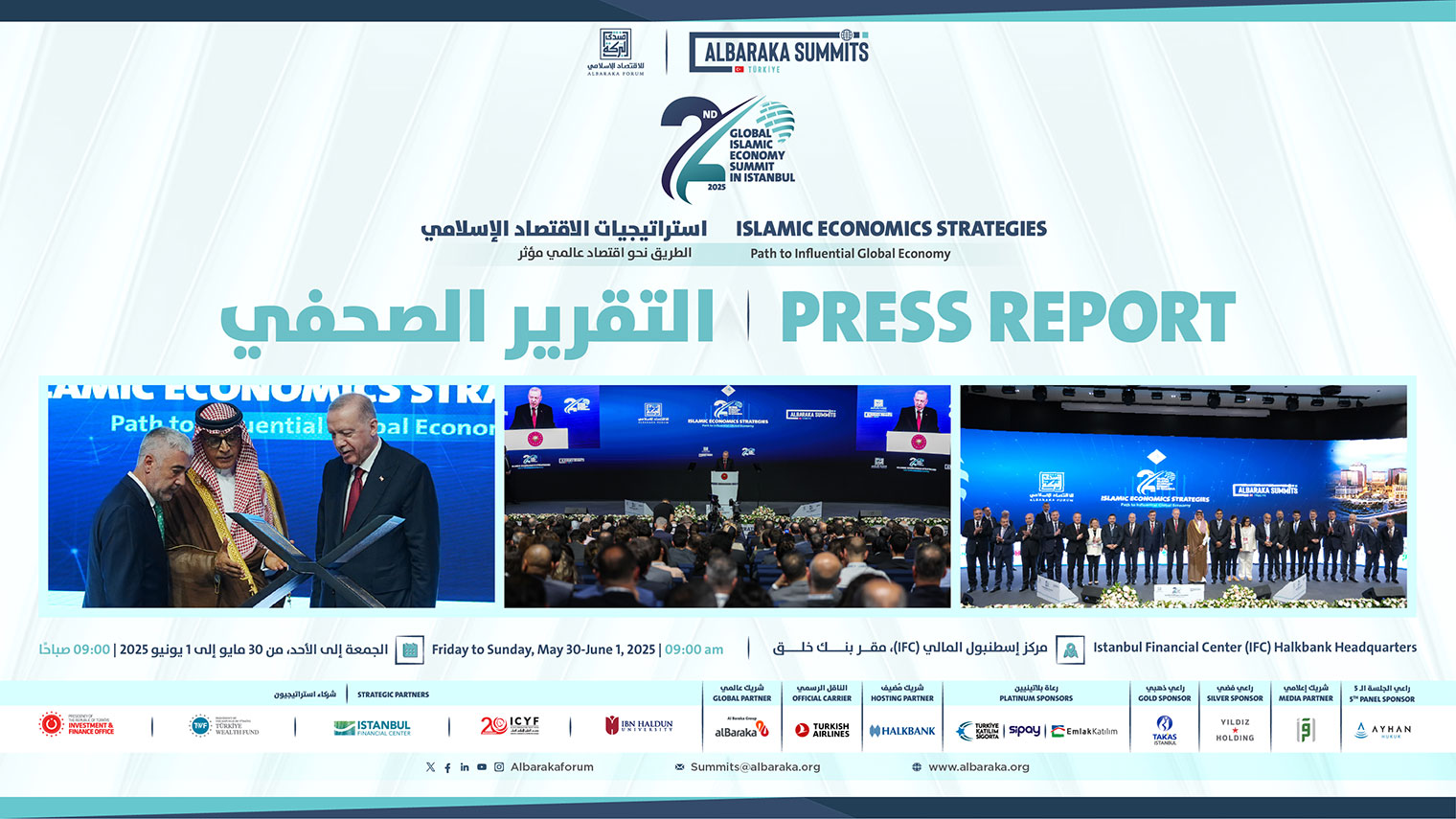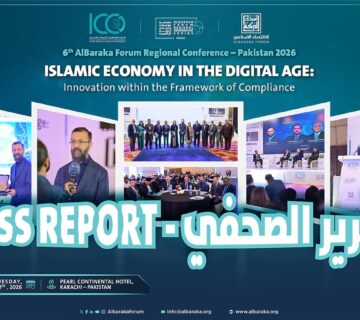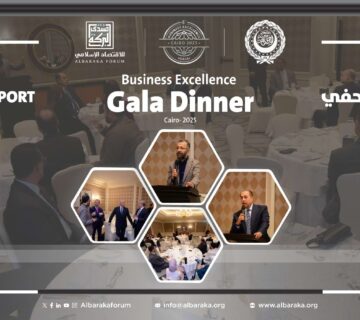Friday to Sunday, May 30 to June 1, 2025 – The 2nd Global Islamic Economy Summit, organized by the AlBaraka Forum for Islamic Economy as part of AlBaraka Summits series, kicked off at the Istanbul Financial Center under the theme “Islamic Economics Strategies: Path to Influential Global Economy.” The event was attended by His Excellency Recep Tayyip Erdoğan, President of the Republic of Türkiye
Hosted by Halkbank, the summit was held in strategic partnership of the Presidency of the Republic of Türkiye Investment and Finance Office, Türkiye Wealth Fund (TWF), Istanbul Financial Center (IFC), Islamic Cooperation Youth Forum (ICYF), Ibn Haldun University, and AlBaraka Group as a global partner. The event was attended by Türkiye’s Minister of Treasury and Finance H.E. Mr. Mehmet Şimşek, Chairman of the Board of İlim Yayma Foundation H.E. Mr. Necmeddin Bilal Erdoğan, President of the Presidency Investment and Finance Office H.E. Mr. A. Burak Dağlıoğlu, CEO and Board Member of Türkiye Wealth Fund H.E. Mr. Salim Arda Ermut, President of the Central Bank of Türkiye H.E. Mr. Dr. Fatih Karahan, and the UN Special Envoy for Sustainable Development Financing H.E. Mr. Dr. Mahmoud Mohieldin, as well as prominent representatives from major regional and international financial institutions, senior policymakers, leading economists, and academics.
During the opening ceremony, President Erdoğan emphasized his pleasure in welcoming participants in Istanbul, a city at the crossroads of three continents. Pointing out that Muslims constitute 25% of the global population, he stated: “Despite this, the size of the Islamic finance sector stands at approximately $2.5 trillion. The 57 member states of the Organization of Islamic Cooperation (OIC), the second-largest international organization after the UN, account for only around 11% of global trade. Representing 25% of the population, we contribute merely 9% to the global economy. These figures indicate that we, as the Islamic world, must maximize our potential in trade, investment, finance, and cooperation.”
President Erdoğan further noted that the ethical, fair, and sustainable approaches of Islamic finance will be examined in detail amid the turbulent global economic climate. “From strategic Islamic economic planning to growth models, from technology-focused fintech solutions to halal approaches, the wide array of ideas to be presented will bring us closer to our goals. As Türkiye, we are committed to acting with the responsibility of being a bridge between cultures and peoples throughout history. The steps we are taking to make Istanbul a global financial hub are opening new doors not only for our country but also for the entire Islamic finance community,” he added.
In his remarks at the Second Global Islamic Economy Summit in Istanbul, H.E. Mr. Abdullah Saleh Kamel, Chairman of the Board of Trustees of AlBaraka Forum for Islamic Economy, emphasized the urgency of collective action amid global economic shifts. “This summit comes at a time of unprecedented transformation, offering emerging economies a rare opportunity to shape the future,” he stated. He reaffirmed the relevance of Islamic economics as “a globally viable alternative rooted in ethics, innovation, and shared prosperity,” calling for practical frameworks that support financial inclusion and long-term resilience. “The future belongs to those who build it,” he added, underscoring the summit’s role in turning shared values into strategic action. He also noted that AlBaraka Summits, held in key global cities, reflect the Forum’s continued commitment to advancing a sustainable and inclusive economic vision on a global scale.
In his address, Minister of Treasury and Finance H.E. Mr. Mehmet Şimşek highlighted the potential of Islamic finance in addressing current global challenges. “We must begin by considering the broader context. Global uncertainty, particularly in trade policies, is at an all-time high. Although this may sound discouraging, every challenge brings opportunities—if you are well-positioned and proactive. Islamic finance is growing rapidly, especially in terms of value and market share, but it still holds just over 1% of the global financial market. If we believe it is the most viable path for the world’s future, then we must recognize that its current scale is still too limited to be the sole focus,” he stated.
H.E. Dr. Mahmoud Mohieldin, UN Special Envoy for Financing Sustainable Development, underscored the critical role that Islamic finance can play in addressing key global challenges, including economic fragmentation, debt distress, and the financing gap for sustainable development. He highlighted that the core principles of Islamic finance—justice, transparency, and risk-sharing—are uniquely positioned to foster more resilient and inclusive financial systems worldwide. Dr. Mohieldin further called for enhanced collaboration among Islamic countries in the lead-up to the forthcoming Financing for Development conference, emphasizing the need for a unified strategy to leverage Islamic finance as a meaningful driver of global economic solutions.
H.E. Mr. Yousef Hassan Khalawi, Secretary-General of AlBaraka Forum for Islamic Economy, emphasized their mission to forge new paths rather than follow existing ones. “That’s why we are in Istanbul, Medina, London, and many other cities. Today, in our morning session, we will present our Sustainability Index at the Istanbul Financial Center. None of our initiatives are carried out in isolation. They require collaboration. I extend my gratitude to our partners and sponsors. Our goal is not only to hold a global summit in Istanbul but also to transform this center into a key component of the Islamic economy ecosystem,” he said.
H.E. Mr. Bilal Erdoğan, Vice Chairman of the Board of Trustees at Ibn Haldun University, underlined Türkiye’s role as a safe haven amid global turmoil. “Islamic economy is not only an alternative financial system but also a crucial domain for an ethical and just life. Through collaboration with universities, scholarship programs, and youth initiatives, we are expanding the Islamic finance sector. Yet, we still face a significant information asymmetry in this field, especially in Türkiye,” he stated.
H.E. Mr. Salim Arda Ermut, CEO and Member of the Board of Türkiye Wealth Fund, emphasized the pivotal role of (IFC) as a strategic hub for Islamic finance. He highlighted the Fund’s significant transactions in Islamic finance, especially its first international sukuk issuance in 2024, a $750 million deal that attracted extraordinary demand, the offering was oversubscribed by more than 15 times, reflecting strong investor confidence.
H.E. Dr. Fatih Karahan, Governor, Central Bank of the Republic of Türkiye, shed light on the remarkable growth of Türkiye’s participation finance sector, which has seen its share in the banking system rise from 5.3% to 8.3% over the last decade.
During the opening ceremony, MOU was signed between AlBaraka Forum represented by Mr. Yousef Khalawi the Secretary-General and Halkbank represented by Mr. Osman Arslan, the Chief Executive Officer. Mr. Abdullah Saleh Kamel, Chairman of the Board of Trustees of AlBaraka Forum for Islamic Economy, presented a handcrafted wooden Qur’an stand brought from Morocco as a gift to H.E. President Erdoğan, who reciprocated with a commemorative gift. The first day concluded with a group photo of the strategic partners, organizers, and His Excellency the President.
As an expression of thanks and appreciation, Mr. Khalawi, honooured the summit’s sponsors:
- Global Partner, Al Baraka Group, represented by Houssem Ben Haj Amor, Group Chief Executive Officer of Al Baraka Group.
- Hosting Partner, HalkBank, represented by Osman Arslan, CEO at HalkBank.
- Platinum Sponsor, Türkiye Katılım Sigorta, represented by Mr. Güray Çelik, General Manager, Türkiye Katılım Sigorta A.Ş.
- Platinum Sponsor, Emlak Katılım Bankası, represented by Mr. Nihat Bulut, Deputy General Manager of Credit Risk Management.
- Platinum Sponsor, Sipay, represented by Mr. Nezih Sipahioğlu, Founder & Global CEO, Sipay.
- Gold Sponsor, Takasbank, represented by Mr. Mahmut Kayacık, chairman of Takasbank.
- Silver Sponsor, Yıldız Holding, represented by Mr. Muharrem Uzunoğlu, Financial Affairs Vice President Yıldız Holding.
- Bronze Sponsor, Ziraat Participation Bank, represented by Mr. Metin Özdemir, General Manager, Ziraat Participation Bank.
- Bronze Sponsor, Colendi, represented by Mr. Deniz Devrim Cengiz, Kurucu Ortak & CEO, ColendiBank.
- 5th Panel Sponsor, Ayhan Hukuk, represented by Mr. Namık Ayhan, Founder of Ayhan Hukuk Office,Member of Bezmialem University Board of Thrustees, member of the board of directors of Darülaceze Vakf.
- Media Partner, Iqraa, represented by Hassan Alattas, Iqraa Media Manager
Among the key highlights of the Summit was the launch of the AlBaraka Islamic ESG Index, developed in partnership with Spectreco. Positioned as a new global benchmark, the index brings together Shariah compliance, ESG alignment, and financial performance through an AI-powered platform designed for transparency, real-time auditing, and institutional use. It enables asset managers, banks, and capital markets to build values-aligned portfolios without compromise. The summit also featured the premiere of a documentary film, “Glimpses of Islamic Banking: From Origins to Contemporary Reality,” which traces the 50-year journey of Islamic finance and its pioneers, while highlighting Türkiye’s emerging leadership in shaping the future of the industry.
Strategic Islamic Economic Planning: The Islamic Banks Strategies for Sustainable and Long-Term Islamic Impactful Economy
The 1st session, moderated by H.E. Mr. Khurram Hilal, CEO, Group Islamic Banking Standard Chartered Bank, had 3 distingushed panelists, namely, H.E. Dr. Adnan Chilwan, Group Chief Executive Officer, Dubai Islamic Bank, H.E. Mr. Iqbal Khan, Chief Executive Officer, Fajr Capital, and H.E. Dr. Admir Čavalić, The Chairman of the Economic and Financial Policy
The 2nd Global Islamic Economy Summit continued with strong participation on its second day, spotlighting key themes such as Islamic finance, ethical investment, digitalization, and sustainable development.
Economic Strategies for Sustainable Growth in Islamic Economics: Integrating Principles with Global Practices
The 2nd session, moderated by Mr Noorur Rahman Abid, Member of the Board of Directors, Kuwait Finance House, featured insights from Hussein Fakhreddine, Acting CEO of QInvest; Rafe Haneef, CEO of MBSB Holding; and Arief Ismail, Director of Compliance and Risk Management, PT Bank Tabungan Pensiunan Nasional Syariah. Discussions centered on protective strategies against market fluctuations, cross-border expansion, and the development of new Islamic economic models to address global challenges.
Well-Being and Environmental Strategies: Social Justice and Economic Empowerment
The 3rd session moderated by Prof. Dr. Ahmet Faruk Aysan, Coordinator of Islamic Finance and Economics Master’s and Doctoral Programs, Hamad Bin Khalifa University, this session brought together Prof. Mehmet Asutay, Professor of Islamic Political Economy and Finance, Durham University, Mr. Mustafa Adil, Head of Islamic Finance, London Stock Exchange Group; and Mr. Mohamed Roushdy, Chief Information Officer, Reem Finance, who examined contemporary issues and future directions in Islamic finance focusing on social justice and sustainability.
Non-Profitable and Halal Economic Strategies within Islamic Economics
The 4th session Under the moderation of Dr. Imran Lum, Head of Islamic Finance, National Australia Bank (NAB), panelists H.E. Mr. Hamid Joda, Founder, Managing Director and CEO, TAJBank Ltd; Associate Prof. Dr. Ziyaad Mahomed, INCEIF University; Dr. Moutaz Abojeib, Director at IFAAS, Member of AAOIFI FinTech Working Group; and Mr. Mahmoud Tatari, General Manager, Halal Control discussed the strategic roles of halal production, zakat, charitable systems, and social justice.
Institutional Workshop: Innovative Financing: Türkiye Wealth Fund’s Sukuk Debut
A dedicated session explored Türkiye’s strategic advances in participation finance. Speakers included Mr. Tarık Özer, Financial Affairs Director, Türkiye Wealth Fund; Ms. İmge Koç, Director of International Capital Markets and Project Financing, Türkiye Wealth Fund; Ms. Gizem Zeynep Bölükbaşı, Vice President, Türkiye Wealth Fund; and Mr. Hasan Ali Kulak, Director of Legal Affairs, Istanbul Finance Center. They highlighted the technical, legal, and market impacts of the sukuk issuance and its role in advancing sustainable and transparent financing models.
Public Workshop: Strategies of Islamic Entrepreneurship and Start-ups for Sustained Success
Moderated by H.E. Mr. Taha Ayhan, President, Islamic Cooperation Youth Forum, this session addressed young entrepreneurs. Dr. Wael El-Desouki, Secretary-General, Sustainable Entrepreneurship and Entrepreneurship Development Organization (SKSEED), offered valuable guidance on fostering innovation aligned with Islamic economic principles and empowering youth for inclusive economic growth.
The 5th session at the final day sponsord by Ayhan Hukuk, titled “The Dynamics of Communication and Marketing for Islamic Economic Tools and Institutions”
Moderated by Mr. Gökhan Yücel, Head of the Communications Department at the Investment Office of the Presidency of Türkiye. Speakers included Mr. Almir Colan, Founder of Muslim Money Matters; Mr. Mohamad H. Khaled, Head of Branding and MarCom at Bank Albilad; Ms. Emb Hashmi, award-winning journalist at the BBC; and Mrs. Farzana Baduel, CEO of Curzon PR. The panel emphasized the growing importance of strategic communication in enhancing the global presence and public understanding of Islamic financial institutions. Mr. Yücel underscored the need for a comprehensive roadmap to improve visibility, performance, and global influence, particularly through digital media channels.
A special Session of the summit was dedicated to young scholars under the auspics of Saleh Kamel Islamic Economics Award. Doctoral researchers from leading Turkish universities—namely Ibn Haldun University, Istanbul University, Istanbul Medeniyet University, Istanbul Sabahattin Zaim University, and Marmara University—presented cutting-edge research in areas such as participation finance, sustainability, behavioral economics, and the impact of Islamic banking on global markets.
Workshop: Demographic Growth and Islamic Economic Expansion: New Horizons
In another highlight, a workshop led by Dr. Eman Shady, Executive Secretary at the Strategic Thinking Center for Islamic Economy, explored how demographic trends, particularly the rise of the youth population in the Muslim world, present both a challenge and an opportunity for Islamic finance. Participants engaged in forward-thinking discussions on how Islamic economic systems can adapt to meet the needs of younger generations and expand their reach to new and underserved markets.
Closing
The summit concluded with a powerful closing address by H. E. Mr. Yousef Khalawi,. Reflecting on the insights gained over the three-day event, emphasizing on the urgent need to redirect Sharia-compliant investment capital toward economic development in Muslim-majority countries. “The majority of Islamic-compliant capital today is invested in advanced economies — the U.S. and Europe — due to factors like readiness and risk tolerance. If this trend continues, true development in our countries will remain out of reach,” he said. “We must build a clear roadmap to attract and retain Sharia-compliant investment within the Islamic world.”
Looking ahead, Mr. Khalawi announced the theme of next year’s summit: “Islamic Capital: The Way Towards Development and Impact.” which will once again be hosted in Istanbul. He also revealed plans for additional high-level events including a the 4th AlBaraka summit in London, the 5th AlBaraka Regional Conference in Cairo, a reception in Dubai , and a presentation on the Islamic Finance Index to be held in Istanbul.
In closing, Mr. Khalawi extended his heartfelt gratitude to all partners, contributors, and attendees who helped bring the summit to life, and he warmly invited all stakeholders to return to Istanbul next year as the community continues to shape the future of ethical finance on a global scale.
The summit was supported by distinguished business and financial institutions including Türkiye Katılım Sigorta, Sipay, Emlak Katılım, Takasbank, Yıldız Holding, Ziraat Katılım Bank, Colendi, and Ayhan Hukuk. Turkish Airlines served as the official carrier, while Iqraa was the official media partner.




